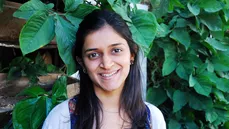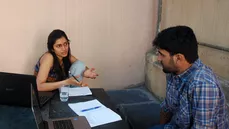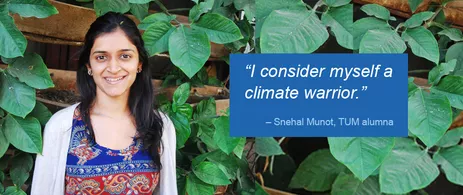“I consider myself a climate warrior.”
TUM alumna wastes no time in her pursuit of a sustainable future
Snehal Munot graduated with a master's degree in Sustainable Resource Management from TUM in 2017. The TUM alumna has always been conscious about her surroundings and about the socio-environmental impacts of mankind. Ms. Munot was educated at a convent school where a deep sense of charity was instilled in her with a particular focus on respecting public spaces and being a good citizen. She currently resides in New Delhi, India, where she is researching ways to further contribute to the fight against climate change.

Snehal Munot has volunteered in several citizen awareness activities that had a strong focus on waste management. Until a few years ago, there was no robust waste management system in India.
But because waste is a problem that affects people's lives every day, she wanted to tackle that very problem. While volunteering at the launch event of Bangalore’s first waste segregation plan in 2013, Ms. Munot met the founder of the sustainability services firm called Smarter Dharma and started working for them.
Why did you decide to pursue a master’s in Sustainable Resource Management?
I always knew I wanted to do a master program in sustainability abroad as there were no dedicated sustainability programs in India at the time. In 2014, after one and a half years of professional sustainability experience at Smarter Dharma and getting a closer look at how sustainability was practiced, I realized that I was in the right direction.
A master program in sustainability would be important in skill building, getting a wider knowledge of industry as well as gaining an understanding of standards and best practices in the field. My interest grew from sustainable waste management to understanding sustainable material use which is the crux of the issue.
How did you come to study at TUM?
Germany was a clear choice to me as I wanted to study and live in a city where sustainability is important to its citizens. Another decisive factor for me was to benefit from a holistic experience when pursuing my degree. The program at TUM was well designed with several options for concentrations. It offered so much for me as a student aspiring to delve deeper into sustainability.
In addition, coming from a big Indian city, my campus was in a small town of Freising, which was interesting and different for me. Most importantly, I was looking forward to seeing sustainability implemented at various levels.
What did you learn at TUM that was vital for your continued path in life?
I have gained and grown a lot at TUM at various levels. I chose to study Environmental Economics & Policy at TUM as this field of concentration was critical for me to understand the crucial economic aspect of sustainability. The understanding I obtained from this degree resulted in more robust solutions design in my research.
Courses like Corporate Sustainability, Marketing & Communication, Conflict Resolution, and Environmental Policy helped me build a well-rounded skill set which can make a big difference to any sustainability professional. This approach translated to improved comprehension and decision making in my life and empowered me.
What experiences or encounters at TUM shaped your career path?

My batch, SRM 14-16, was such a beautiful and diverse cohort of 40 different nationalities. The one thing that comes to your mind when you think of a class like that is: How are we going to communicate with such a diverse group that will have different socio-cultural backgrounds? Even though I am a people’s person, there was support from TUM in the form of a compulsory course in cross cultural communication.
The high degree of interactive exercises that were designed into SRM equipped us with soft skills like patience, empathy, co-operation and curiosity and trained us to be very good communicators – a skill that will benefit any individual for a lifetime. I learnt that effective communication is going to be indispensable in the fight against climate change in mobilizing people to act. This holds true whether it’s an individual or a professional team or company.
An encounter that I would like to highlight is one with my professor, Dr. Charles Savage. He taught us a part of the module Natural Resources. Dr. Savage opened a completely new angle of sustainability to me – the cultural angle. My interactions with him have made a very significant impact on me. I found the teacher-student rapport at TUM great!
What motivates you most in your work?
The sense of a global community. As someone who loves nature and its beings, humanity to me is the world as we know it today – the forests, the biodiversity on land and in water, the various topographies. The more I meet people and experience new surroundings, the stronger this feeling becomes and I want to protect that.
What is your wish for the world and for society in 50 years?
Reaching net zero emissions. Significantly halting climate change and in that process, I hope the world would have transformed into a much more compassionate home for all beings. There are the nine planetary boundaries defined by Swedish scientist Johan Rockström. I wish that we understand its significance and effectively tackle issues so humanity can elongate its life on this beautiful blue planet.
Snehal Munot strongly believes that India – when it finally opens up after several lockdowns – will start exploring new opportunities. She has realized that sustainability is becoming an important factor in many industries. Businesses too are urgently looking to either create or expand their sustainability teams. It is a very exciting time to be in India – there is a lot of action and an immense potential for impact. We wish our alumna the very best in her future endeavors!
